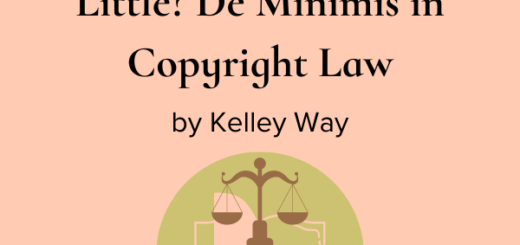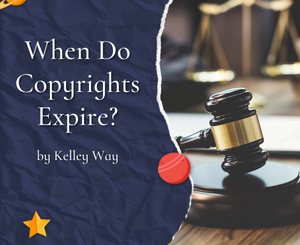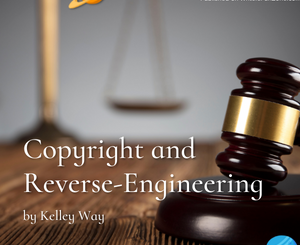How Do I Put A Copyright Into My Trust by Kelley Way
 Let’s welcome back monthly columnist Kelley Way as she shares with us “How Do I Put A Copyright Into My Trust.” Enjoy!
Let’s welcome back monthly columnist Kelley Way as she shares with us “How Do I Put A Copyright Into My Trust.” Enjoy!
***
All right, you’ve created a trust. You’ve also created a copyright, one that’s valuable enough that you want to put it into your trust to protect it. You may even have several income-producing copyrights that you want to put into your trust. So how do you go about doing that?
Unfortunately, it’s not as simple as writing “all my copyrights” in the list of trust assets. Moving a copyright into a trust is technically a transfer of ownership, and copyright law clearly states that all transfers of ownership have to be in writing to be effective.
Moving a copyright into a trust
That means that you need to (legibly) write on a piece of paper that you are assigning your copyright to your trust – though if you wanted to go crazy and type it up I wouldn’t stop you. You also have to identify by name the specific copyright (or copyrights) you are assigning.
Again, it’s not enough to simply say “all my copyrights.”
Finally, you have to sign and date the statement in order for it to be valid. You don’t have to notarize it, but it’s not a bad idea to add that extra stamp of credibility.
A whole portfolio of copyrights?
But what if you have a whole portfolio of copyrights? Some content creators are quite prolific, and the idea of having to name each individual copyright in an assignment can be quite daunting when the list of copyrights runs longer than a page (without giving each copyright its own line.)
While the Copyright Act requires the assignment to be in writing, it does not say that the name(s) of the copyright(s) must be on the same page as the assignment.
That’s when “incorporation by reference” – a legal concept I’m quite fond of – comes in. If you say something to the effect of: “I’ve assigned all the copyrights listed on the following page(s),” then you can simply attach your copyright list from your portfolio.
(You DO have a list of all your copyrights around somewhere so you can track your profits, right? If you don’t, consider this your kick in the pants to create one.)
Notify the Copyright Office
If you wanted to go one step further, you are also supposed to notify the Copyright Office when a registered copyright changes ownership. (I think the Copyright Office would like it to be a requirement, but since you’re not required to register your copyright in the first place they can’t really make you update your registration.)
The cover letter should include the name of the trust, the date the trust was created, and the name(s) and registration number(s) of the copyright(s) that were assigned to the trust. Again, if there are quite a few copyrights involved, you can simply attach a list to the cover letter, or tell them to look at the list from the assignment.
Just make sure that the list includes the copyright registration numbers – they’re far more likely to send everything back unprocessed than look the numbers up themselves.
In Summary
So to summarize, in order to put your copyrights into your trust, you need to assign them to your trust by name, in writing. The document must be signed by you. While it’s not required to notify the Copyright Office, it’s a good idea so their records are kept up to date (and it saves your executor/trustee from having to do that after you’re gone.)
If this all sounds terribly confusing, or far more work than you want to do on your own, you are welcome to contact me. I am happy to answer your questions, or put your copyright(s) into your trust for you. Just email me at kaway@kawaylaw.com.
***
ABOUT THE AUTHOR
Kelley Way was born and raised in Walnut Creek, California. She graduated from UC Davis with a B.A. in English, followed by a Juris Doctorate. Kelley is a member of the California Bar, and an aspiring writer of young adult fantasy novels. More information at kawaylaw.com.








What if you simply want to leave your copyrights in your will. Have you discussed that and I’ve missed it? Thanks!
Good question! You can certainly use your will to give away your copyrights. The only potential issue is that, if your copyright is valuable enough, it could cause the estate to go through probate (that’s when the government oversees the distribution of your estate). Items owned by the trust aren’t considered part of your estate for probate purposes, which is why a copyright that’s bringing in a lot of money is probably better off in a trust.